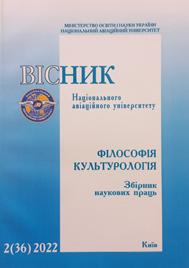MAN IN THE TIME OF INTER-CIVILIZATIONAL CHALLENGES OF THE GLOBALIZED WORLD
DOI:
https://doi.org/10.18372/2412-2157.36.16973Keywords:
globalized world, hybrid wars, virtual space, digitalization, values, information technologies, educationAbstract
Introduction. The main trends of the modern world are connected with globalization processes, which both initiate its development and
oppose it. Being at the stage of overcoming the ecological, political, cultural, and other contradictions, the humanity of the 21st c. cannot
remain within the framework of past forms of existence. The aim of this study is to analyze the new conditions of living for man and
humanity in the era of inter-civilizational challenges of the globalized world. Research methods and principles a reused: analyticaldescriptive
method, socio-cultural, general-scientific principles of historicism, and unity of historical and logical methods. The
comparative approach helps to compare the predictions of scientists regarding the new values and conditions of human existence in the
21st century. Research results. At the end of the 20th century, a number of organizations emerged (Clubs of Rome and Bilderberg,
etc.), in which research on the civilizational development of mankind and further forecasts of its existence are conducted. The
researchers concluded that a global collapse will occur in 2050. The idea of "zero growth" or a controlled balance of power has been
proposed (Meadows, 2022). To come that true, the restructuring of consciousness, the introduction of norms of human behavior and
norms of state policy in accordance with new humanistic standards, the integration of humanity, and the formation of a global ethnos
with common ideals, values, and goals are needed. S. Huntington's concept of the clash of civilizations, which consolidates around
traditional religions, is relevant today. Determining the importance of the civilizational definition of Ukraine, following the concept of S.
Huntington, the uniqueness of the position of our state to restore the global balance in the globalized world is emphasized. The global
trend in the world labor market of the 21st c. is the automation of professions. The confusion in the face of a new challenge is
aggravated by conflicts that turned into full-fledged wars. Discussion. The problem of human perspectives during the inter-civilizational
challenges of the globalized world was considered by Yu. Habermas, L. Drotianko, O. Sidorkina, L. Komisar, I. Lytovchenko, N.
Tkachuk, L. Chuppiy, I. Bohdanovskyi, O. Lyovkina and many others. Conclusions. S. Huntington's concept stands out among the
predictions of the existence of humanity in times of inter-civilizational challenges. Changes in the balance of civilizations’ power have led
to a change in the living space of each person in such a way that belonging to a certain group of countries or civilizations has become a
problem of personal choice and a psychological necessity that affects the deepening of cultural identity differences, the property
differentiation of countries and the world's population, and the strengthening of the unevenness of economic development, etc.
Therefore, most researchers return to the problem of the multidimensionality of man. This problem is closely intertwined with the
problem of reforming the educational process, proving the illusory nature of some unsuccessful forms of education and preparing a
person for life in the fast-moving modern world. To solve global problems, one should aware of the paradox of the human situation, to
come from trembling to lost awe, and, starting from the negative (horror of futuristic perspectives), again to reach the positivity we
imagine.
References
Fukuyama F. Тhe End of History and The Last. Free Press. 1992.
Горбатенко В. Римський клуб і організація трансдисциплінарних проектів з довгострокового прогнозування глобальних проблем. Політичний менеджмент. 2012. № 3. С.52-64. https://ipiend.gov.ua/wp-content/uploads/ 2018/08/.
Дротянко Л. Г. Цифровий вимір сучасного етапу цивілізаційного розвитку соціуму. Вісник Національного авіаційного університету. Серія: Філософія. Культурологія: Збірник наукових праць. № (1) 33. К. : НАУ, 2021. С. 16-20.
Комісар Л. П. Автентичність і екологія як аксіологічні тренди постпандемічного світу, або пере перевідкриваючи «словник цифрової епохи». Вісник Національного авіаційного університету. Серія: Філософія. Культурологія: Збірник наукових праць. № (1) 35. К. : НАУ, 2022. С. 45-48.
Литовченко І. В., Ткачук Н. Г. Інформатизація освіти в умовах глобалізації суспільства як об’єкта соціально-філософського аналізу. Вісник Національного авіаційного університету. Серія: Філософія. Культурологія: Збірник наукових праць. № (1) 33. К. : НАУ, 2021. С. 51-54.
Медоуз Д. Пределы роста. 30 лет спустя /перевод с англ. М. : Академкнига, 2007. 342 с.
Подопригора А. В. Число и цифра: пифагорейская традиция и метафізика цифровой реальности. Научный ежегодник Института философии Уральского отделения Т.18. вып. 3. РАН, 2018. С.7-21.
Сідоркіна О. М. Людина і природа у феномені робінзонади. Вісник Національного авіаційного університету. Серія: Філософія. Культурологія: Збірник наукових праць. № (2) 32. К.: НАУ, 2020. С. 51-56.
Сокол К. Доповіді Римського клубу про перспективи виживання людства в умовах глобалізації. https://repo.knmu.edu.ua 10. Хабермас Ю. Будущее человеческой природы. М. : Изд-во «Весь Мир», 2002. 144 с.
Хантингтон С. Столкновение цивилизаций и преобразование мирового порядка : монографія / пер. с англ. Т. Велимеев, Ю. Новиков. М. : ООО Изд-во АСТ, 2003. 603 с.
Чупрій Л. В., Богдановський І. В., Льовкіна О. Г. Цивілізаційна роль України В сучасному глобалізованому світі. Регіональні студії. № 24. 2021. С.170-175.


